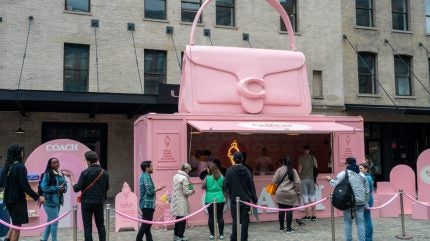
The FTC has issued an administrative complaint and authorised a lawsuit in federal court to block the proposed acquisition, alleging that Tapestry’s acquisition of Capri will “eliminate fierce competition between the two companies.”
Director of the FTC’s Bureau of Competition, Henry Liu claimed the deal “threatens” to deprive consumers of the competition for affordable handbags, while hourly workers stand to lose the benefits of higher wages and more favourable workplace conditions.
He alleged that Tapestry aspires to become a “serial acquirer,” and the acquisition of Capri, which owns Jimmy Choo and Michael Kors amongst others will further “entrench its stronghold” within the fashion industry.
FTC believes the proposed merger threatens to deprive millions of American consumers of the benefits of Tapestry and Capri’s head-to-head competition, which includes competition on price, discounts and promotions, innovation, design, marketing, and advertising.
It added the deal threatens to eliminate the incentive for the two companies to compete for employees and could negatively affect employees’ wages and workplace benefits.
The US regulatory authority asserted that following the acquisition, the combined entity would employ roughly 33,000 employees globally.

US Tariffs are shifting - will you react or anticipate?
Don’t let policy changes catch you off guard. Stay proactive with real-time data and expert analysis.
By GlobalDataAccording to FTC, this acquisition would also give Tapestry a dominant stake in the “accessible luxury” handbag market, a term coined by Tapestry to describe quality leather and craftsmanship handbags at an affordable price.
The US regulatory authority explained in the complaint that Tapestry and Capri currently compete across various product lines, including clothing, eyewear, and shoes. However, it noted that their most intense competition lies in the “accessible luxury” handbag market, particularly between Tapestry’s Coach and Kate Spade brands and Capri’s Michael Kors brand.
It accused Tapestry of using serial acquisitions through the decade to achieve its dream of becoming “a major American fashion conglomerate.”
“Given Tapestry’s pattern of serial acquisitions, the acquisition of Capri will further entrench Tapestry’s stronghold, making it harder for new brands to both enter the market and have a meaningful presence,” added FTC.
FTC also pointed out in its complaint that documents produced by Tapestry indicate it has no plans to stop acquisitions even after this proposed merger.
Tapestry and Capri Holdings’ defend merits of merger
Tapestry issued a statement in response to FTC’s action and said: “There is no question that this is a pro-competitive, pro-consumer deal and the FTC fundamentally misunderstands both the marketplace and the way in which consumers shop. Tapestry and Capri operate in an intensely competitive and highly fragmented industry alongside hundreds of rival brands, including both established players and new entrants.
“We also compete for consumers who are cross-shopping a wide range of channels and brands along a vast pricing spectrum when considering what to purchase. The reality is that consumers have a host of choices when shopping for luxury handbags and accessories, footwear, and apparel, and they are exercising them.”
The Coach owner clarified that Tapestry and Capri face “competitive pressures” from both lower- and higher-priced products, calling out FTC for ignoring the reality of today’s “dynamic and expanding $200bn global luxury industry.”
Tapestry added the merger with Capri intends to integrate all six brands with the merger allowing access to a “broader set of global luxury consumers and geographies.” This strategic move is reportedly aimed to drive “sustainable, healthy growth” for Capri’s brand portfolio while building desire and engagement with consumers globally.
Tapestry continued: “Tapestry has a strong record of not only innovating for consumers but also providing industry-leading wages and benefits for our employees. The combined company will continue to set the bar for both consumer and employee experiences. We have full confidence in the merits and pro-competitive nature of this transaction. It will bring significant benefits to the combined company’s customers, employees, partners, and shareholders in the US and around the world.”
Capri Holdings agreed and added: “The market realities, which the government’s challenge ignores, overwhelmingly demonstrate that this transaction will not limit, reduce, or constrain competition. Tapestry and Capri operate in the fiercely competitive and highly fragmented global luxury industry.
“Consumers have hundreds of handbag choices at every price point across all channels, and barriers to entry are low. Capri intends to vigorously defend this case in court alongside Tapestry and complete the pending acquisition. We remain confident in this combination and the value it will bring to all stakeholders.”
The companies also claimed FTC is the only regulator to disagree with the merger.
Brief overview of the deal
In August 2023, Tapestry announced its plan to expand its brand portfolio with the acquisition of rival global fashion luxury group Capri Holdings Limited, in a deal valued at $8.5bn.
At that time Tapestry said it would be uniting six “distinctive brands” and expanding its portfolio reach across consumer segments, geographies and product categories.
The board of directors from both Tapestry and Capri Holdings Limited unanimously approved the transaction which it anticipated to close in calendar year 2024, subject to approval by the Capri Holdings shareholders, as well as the receipt of required regulatory approvals, and other customary closing conditions.



